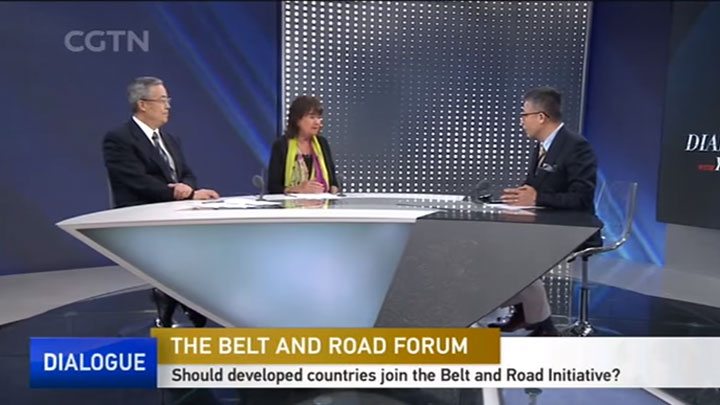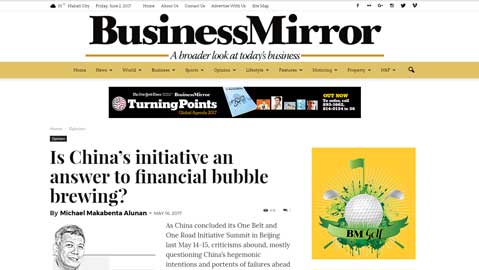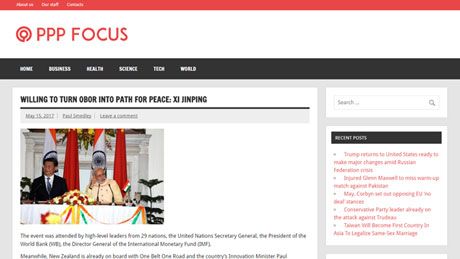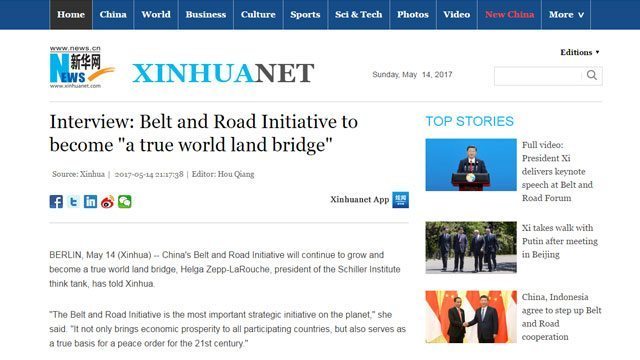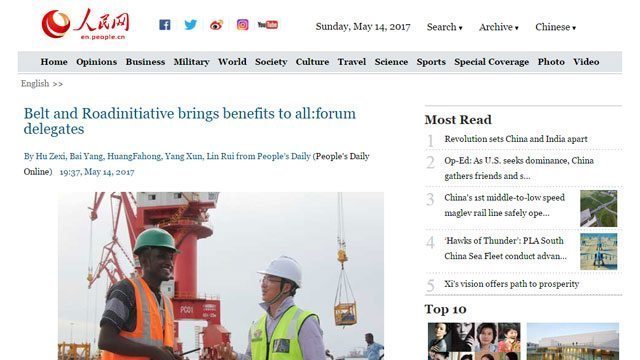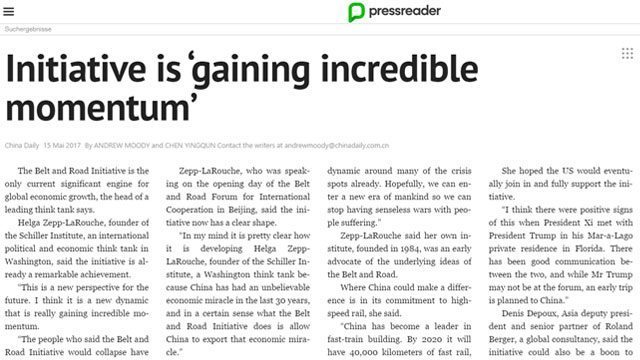A group of forty individuals, including medical professionals, farmers, musicians, scientists, educators, clergy, civil rights leaders, community activists and concerned citizens, held a round table discussion on October 23rd, 2020, in response to the call issued by Schiller Institute chairwoman Helga Zepp-LaRouche to form The Committee for the Coincidence of Opposites to address the COVID pandemic, now coupled with an extreme famine crisis. The discussion was begun with brief remarks from Zepp-LaRouche; Dr. Joycelyn Elders, former U.S. Surgeon General; and Mike Callicrate, farm leader, and owner of Ranch Foods Direct. A lively elaboration followed in which several medical professional detailed work which they have already been conducting in Africa, Asia and South America, as well as in the U.S., which would lend itself to the type of community healthcare worker (CCC program) that Zepp-LaRouche and Dr. Elders have been emphasizing. Farm leaders discussed their willingness and capability to produce enough food to stop starvation feed the world, if given the go ahead and parity prices to survive and continue producing. The video below includes introductory remarks from Zepp-LaRouche, Dr. Elders and Mike Callicrate.
On January 3rd, 2019, for the third year in a row, a memorial was held in Bayonne, New Jersey for the victims of the December 25th, 2016 plane crash which took the lives of the many members of Russia’s famous Alexandrov Ensemble, journalists, philanthropist Elizaveta Glinka, and others. This memorial, organized by the Schiller Institute, took place at the foot of the “Tear Drop Memorial,” a 100-foot statue gifted to the United States by the Russian Federation in 2005 in honor of the victims of the September 11th, 2001 terrorist attacks.
Members of the Schiller Institute and the Schiller Institute NYC Chorus, led by Diane Sare, Founder and Co-Director, were joined by the Bayonne Fire Department Honor Guard, Captain Haiber and Chief Weaver of the Bayonne Fire Department, Dmitry Chumakov, Deputy Permanent Representative of the Russian Federation, Dr. Louay Falouh, Minister Counselor of the Syrian UN Mission, Father John Fencik of Saint Mary’s Carpatho-Russian Orthodox Church, and others in the ceremony. In opening the ceremony, the Chorus sang both the Russian national anthem (in Russian) and the US national anthem. The Bayonne Fire Department Honor Guard stood at attention throughout the forty five minute ceremony.
These performances were followed by comments from Deputy Permanent Representative Chumakov, who paid tribute to the victims of the 2016 tragedy and spoke to the continuation of the efforts of both the reconstituted Alexandrov Ensemble and the Charity Foundation of Elizaveta Glinka. He concluded with significant statement of Russian policy in Syria: “Considerable progress has been made on Syria in 2018. Now we need to step up joint efforts to launch the Constitutional Committee in Geneva, that would enjoy support of the Syrian parties, in accordance with the decisions of the Syrian National Dialogue Congress in Sochi. Syria’s future must be determined by the Syrians themselves in a political process they conduct and control with international mediation. Such an approach would contribute to settling and overcoming the consequences of the war; re-establishing the country’s full sovereignty and territorial integrity.” Mr. Chumakov’s full statement is available on the Russian Federation UN Mission’s website.
Then spoke Dr. Louay Falouh, Minister Counselor of the Syrian UN Mission, who thanked the government of the Russian Federation for their work to support Syria, and expressed his deep condolences for the losses of December 25th, 2016. Chief Weaver and Captain Haiber of the Bayonne Fire Department separately gave profound remarks expressing their condolences, as well as their thanks to Russia for the comfort they personally felt when visiting the Tear Drop Memorial. Bayonne first responders received enormous numbers of people fleeing by boat from Manhattan on 9/11. Captain Haiber told the audience, “At times like this, we are neither Russian nor American—we are human.” He also spoke in Russian, expressing his wishes for peace and friendship.

Father Fencik, whose close relative had been the translator at the famous meeting on the Elbe River between Soviet and American forces, gave an invocation saying that these dead will never be forgotten, and then gave a sung prayer in Russian.
At the conclusion, Diane Sare, Founder and Co-Director of the Schiller Institute NYC Chorus, spoke on behalf of the Schiller Institute and the Schiller Institute NYC Chorus, and read aloud the written message from Schiller Institute President Helga Zepp-LaRouche.
Two years after the tragic death of 64 members of the Alexandrov Choir Ensemble on their way to Syria on December 25th, 2016, that country is now almost entirely freed from the terror of ISIS due to the determined intervention of Russia in collaboration with the Syrian army. This liberation demonstrates what human beings can do when they unite with a good plan and for a just cause, and that, as Friedrich Schiller would say, even the most tyrannical foe can be subdued. As now there will be a more hopeful period in the history of Syria, with the economic reconstruction and the return of millions of refugees, the memory of the Alexandrov Choir Ensemble will be written into the history of Syria and should be celebrated every year with beautiful concerts in many cities, celebrating the Russian-Syrian friendship and the immortality of great art and the artists, who devote their lives to the ennoblement of mankind.
— Helga Zepp-LaRouche, Founder, Schiller Institute
Diane concluded her remarks by saying that this moment called to mind to words that Handel had immortalized the his Messiah “Death is Swallowed up in Victory.”
Each of the speakers made a special point of thanking the Schiller Institute for organizing the event. Russian news service TASS, as well as TV stations Russia 1 and RT were present.
Participation in this event had a profound effect on our activists and choir members who joined in. Patrick from Connecticut said, “I was so glad to be there and be a part of this. As I looked around and saw who was gathered here, I felt like we were on a kind of different planet from the rest of the population – and how important is that we do this.”
At the beginning of 2018, Helga Zepp-LaRouche said the most important goal for 2018 was ending the stranglehold of geopolitics. While we still have much to do, many historic steps have been taken in that direction around the world.
See Helga’s special 2019 New Year message for a review of what we’ve accomplished in 2018, and what’s needed in 2019.
Schiller Institute founder Helga Zepp-LaRouche gave an interview on Dec. 31 to China Radio International’s “World Today” broadcast coverage of the EU-China Comprehensive Agreement on Investment (CAI). The interview can be found here: http://chinaplus.cri.cn/podcast/detail/1/2689962, it starts at 29.47, and includes Dr. Qiao Hai [ph] of the Chinese Academy of Social Sciences.
What follows is the exchange between CRI’s moderator and Helga Zepp-LaRouche:
CRI: Let’s begin this second half with the big investment deal between China and the European Union. The negotiations for a Comprehensive Agreement on Investment (CAI) was first launched in 2014, just before another new year. Both sides say the negotiations are complete. The announcement was made via a video link following a meeting between Chinese President Xi Jinping, his French counterpart Emmanuel Macron, Germany Chancellor Angela Merkel, and heads of the European Council [Charles Michel] and European Commission [Ursula von der Leyen]. President Xi Jinping said the agreement show China’s determination and confidence in further opening up its economy to the rest of the world. He said, it would help the world’s two major economies make a significant contribution to the world economic recovery in the post-pandemic era.
To talk more about this, we’re joined by Helga Zepp-LaRouche from Germany. She’s the founder of the Schiller Institute, an political and economic think tank; and Dr. Qiao Hai from the Chinese Academy of Social Sciences. Thanks for joining us.
HELGA ZEPP-LAROUCHE: Hello.
CRI: Speaking of the importance, Helga, how do you understand the significance of this agreement for both sides?
ZEPP-LAROUCHE: I think it’s extremely beneficial. But if favors so far the larger firms and I think it needs to be more extended, also, for the smaller and medium enterprises. But I think the fact that President Macron from France participated in the signing ceremony is extremely important, because he has no title in that leadership of the EU, but it signals that both Germany and France are in total agreement.
Also I think it is very important that not one ambassador was against it: This is very important, because this agreement still has to be signed by all the national parliaments and EU, so the prospect that it will go through smoothly is actually looking very good. I think this is a major breakthrough for the whole world.
CRI: Helga, according to a transcript of an online meeting between the EU leaders and Chinese President Xi Jinping, French President Emmanuel Macron offered to visit China in the coming months, along with German Chancellor Angela Merkel, to discuss other areas of cooperation, such as healthcare and the environment. Are we going to see a stronger tie between China and the EU and stronger ties between China and European nations?
ZEPP-LAROUCHE: I definitely hope so. We are definitely in a world of great challenges, the pandemic is not over, international cooperation, and therefore my hope would be that European leaders would turn to Leibniz, who already in the 17th century said that is so happens that the most advanced cultures are situated at each end of the European continent, and they should join hands and develop the region in between. Now, I would hope that with China having made major concessions in this China-EU Investment, that Europe, in the other side would also be more open to cooperation with the Belt and Road Initiative. Because that would really give the framework to address all the many challenges, such as the underdevelopment of the developing sector. In order to overcome the pandemic, it is not enough to throw cash at the crisis when it is there, but I think that China and the EU should work together to industrialize Africa, Southwest Asia, and other regions, because otherwise, the danger of new pandemics will always exist.
I would hope European leaders would turn to Leibniz in their approach, because Leibniz, was an absolute admirer of Chinese culture. And I think Europeans have so much to discover if they study Chinese history and culture and philosophy, poetry, painting—there are so many things to be discovered, and I would hope that this agreement opens the way for a new renaissance in relations between the two.
CRI: Helga, what’s your take? Are those concerns from the U.S. society legitimate?
ZEPP-LAROUCHE: I think The “concerns,” so-called, are purely ideological and motivated by geopolitical thinking. In the recent period there has been an unprecedented anti-China campaign in the United States, which is blaming China for every problem on the planet, which is completely hysterical. But there is no way how the rise of China—which is really the motive for this—can be stopped! China is a country of 1.4 billion people, with a policy based on innovation. And China has been the leader of technological development for many centuries. So if China is now coming back as one of the most important four nations in the world, people should be happy about it, because, from everything I have studied and seen, China is a benign factor and does not do what the U.S. is accusing it of.
So I think it will be beneficial for U.S. firms, as Mr. Qiao just said. The anti-China sentiment, by the way, is not shared by many U.S. firms, by many of the governors, by many of the elected officials. So hopefully the example which is set now by China and the EU will also influence the situation in the United States.
CRI: Helga, many believe the conclusion of the agreement also shows the EU respects its relationship with the United States, but will not wait for the United States any longer. Do you detect a change of the EU-U.S. relations, when it comes to trade?
ZEPP-LAROUCHE: Well, it’s a mixed situation, because despite the fact that this ceremony was signed, Michel, from EU Council, still called China a “strategic rival.” But I think there is a general tendency in Europe to assert more sovereignty. Also within the different nations in Europe, there is a growing sense that national sovereignty is important. I hope this will lead to a new paradigm, because I think we need a completely new paradigm in in international relations, where geopolitics must be overcome. Geopolitics led two times to a world war in the 20th century, and the proposal by President Xi Jinping for a “shared future of mankind,” is, I think, a very important expression of this new paradigm. And if people start to study that and realize that in the post-pandemic world, either we find new ways of relating to each other or we will be doomed together. This is a branching point in history, where hopefully people will be open with new visions about the future of humanity.
CRI: Helga, do you think this deal will be a stepping stone to an EU-China free trade agreement?
ZEPP-LAROUCHE: Well, I think it will be a stepping stone, hopefully, for an even larger conception, because we need, really, a new world economic order. I think that the most challenging question is the development of the developing countries. We have a famine, which, according to the World Food Program threatens 270 million people’s dying by starvation in 2021. And I think there needs to be a crash program to overcome that. And I think the most important economic powers have to work together, and I really think the combination of pandemic and danger of world famine should be a motivation to really go for a completely different design, where the common good of the people is being put first and not the maximization of profit. This is a very important challenge to humanity that we take this step, and go away from what has been the financial system, where only the maximizing the profit of the speculators was what counted. This is a challenge to the sovereign governments of the world to respond to the need for the common good of their people. That is what people should think about.
Helga Zepp-LaRouche, on Dec. 28, in a discussion with Schiller Institute members from the United States, Canada, Gambia, Ireland, Denmark, Italy, and Germany about the insanity of Secretary of State Pompeo amidst the danger of extreme international tensions amidst the pandemic, and the threat of a famine of biblical proportions, said that it was of urgent importance for President Donald Trump to call Russia and China immediately to convene the P5 summit called for by Russian President Putin in January of this year.
She said:
“I think that President Trump, no matter what happens on January 6, whether or not he will be in the White House on January 20, he could do one thing. He could immediately call up Russia and China and say that because of the crisis, because of the pandemic, because of the famine, because of the danger to world peace, that he wants to respond to the offer of Putin to have the summit of the permanent five members on the UN Security Council, which President Putin has been advocating since January. Trump should say that he wants to have that summit right away. And that would be the very best thing he could do to counter all of this propaganda.
“The more people call the White House to suggest that, and who express [the need for the summit] in any other way, the better. I have no idea why Trump has not kicked out Pompeo. He is the same as Bolton on many of these issues. President Trump did have the courage to kick out Bolton. That was one of the best things he ever did.
“But I think to outflank [these dangers], in this incredibly complex situation, is for President Trump to now follow up on Putin’s offer for this summit, and meet with Putin, and Xi Jinping. This meeting can happen. French President Macron has already said he supports having such a summit, [U.K. Prime Minister] Boris Johnson has said he is in favor of it. But the truly important people are Presidents Trump, Putin, and Xi Jinping, who will be the difference in such a meeting. Johnson and Macron could not ruin such a combination. That is the one thing that Trump must be encouraged to do. I’m 100% sure that Russia and China would absolutely go for it immediately.”
PARIS, July 10 – Schiller Institute President Helga Zepp-LaRouche was invited on July 6 to address the Institut Mandela for the African Economic and Consular Days in Paris.
Madame Zepp-LaRouche was invited on the subject “Partnership, Inclusive Growth and Infrastructure in Africa” following the publication of her call to the European Union to apply the model of the Singapore summit between President Trump and Chairman Kim Jong-un to a European development project for Africa. Her appeal, “History Is Now Being Written in Asia! The EU Summit Must Follow the Example of Singapore!” has been being circulated in the African networks in France, as well as throughout Europe.
The video of her remarks is available HERE and the transcript is below.
The first panel presented the “Singapore spirit” with the participation of the Ambassador of Eritrea, speaking on the end of the war with Ethiopia and the economic perspective of the biggest free trade zone in Djibouti, for real cooperation in the region.
Following her presentation was Ghana’s Minister Plenipotentiary and Deputy Head of Mission Bonaventure Adjavor at the Paris Embassy, who developed the concept of a new era for Africa—a new era of manufacturing from raw materials, and no longer merely exporting them. He used the example of cocoa, of which Ghana and Ivory Coast have 80% of world production, all of which goes for export. But he described that cocoa can be a primary material for manufacturing many products, including brandy, body lotion, chocolate, etc., and that the policy of President Nana Addo Dankwa Akufo-Addo’s government is to do that.
President Akufo-Addo, then newly elected, is famous for his public lecture to visiting French President Emmanuel Macron during their joint press conference on Dec. 4, 2017, in which Akufo-Addo said Africa “can no longer continue to make policy for ourselves … on the basis of whatever support that the Western world or France, or the European Union can give us…. We have to get away from this mindset of dependency. … Our concern should be what do we need to do in this 21st century to move Africa away from being cap in hand … to have a mindset that says we can do it … and once we have that mindset we’ll see there’s a liberating factor for ourselves.”
Helga Zepp-LaRouche then spoke, defining the long-term perspective for Africa and the world, presenting the World Land-Bridge report and the physical project for Africa within the framework of the Belt and Road dynamic, as in Ethiopia with the high-speed train. She also presented the other projects the Schiller Institute has developed or promoted including the Transaqua project, and the extension of the World Land-Bridge into Africa via a tunnel between Spain and Morocco and/or between Sicily and Tunisia.
The audience was very challenged by the optimistic vision of Africa, as Mrs. Zepp-LaRouche showed the photograph of Africa from space at night, as it is now, and as it would be, all lit up, in 2050.
All 40 people in the room and on the panels were members of institutions, such as the International Organization of La Francophonie, and lawyers, entrepreneurs, public relations, etc.
The next speaker was the president of the Efficiency Club, formed by the Diaspora and first pan-African economic network of Europe. They are trying to stop the flow of remissions from the diaspora to Africa just to help their families survive. He developed the necessity to create a network of small and medium enterprises (SMEs) throughout the continent to provide jobs and not just subsistence on money.
Then a final panel was very interesting, with one of the panelists bringing in the economics of Alexander Hamilton, and how Africa has to go with this manufacturing economy. He also mentioned that Colbert had called Huygens and Cassini to France to develop a real science academy, and asserted that Africa has to do the same today. Many contacts were made … our time is now.
The Institut Mandela is dedicated to the strategic mission of Africa’s emergence as well as the “open society” values of peace through “intellectual diplomacy.” Its proposals are conveyed to public policymakers, the international community, private actors, and civil society, so that they can make visionary decisions. Its fundamental mission is to reorganize intellectually and institutionally the African countries.
The Institut’s activities revolve around six research areas:
Security and Development, Emergence of Africa, Geopolitics and Geostrategy of raw materials, Africanization of democracy, Prospects of African governance, Energy and Environment.
The Mandela Prizes are awarded annually to personalities or institutions to acknowledge their laudable actions in favor of Africa and peace, in the spirit of Pan-Africanism.
Transcript of Helga Zepp-LaRouche’s remarks:
Ladies and Gentlemen:
There is a profound reason for optimism for the African continent, because with the rise of China, and especially the New Paradigm which emerged with the Belt and Road Initiative, the world has been changing, especially in the last five years with an incredible speed. What China has done with the New Silk Road is to develop a new model of relations among each other, and it is an initiative which is open to all nations of the world.
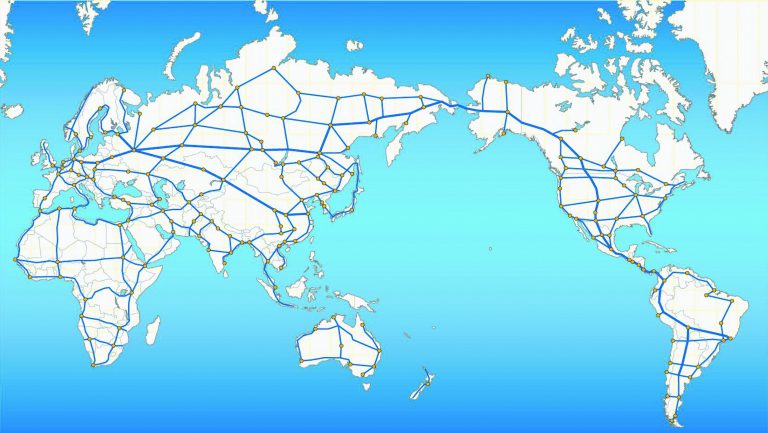
So this map is actually a map of uniting all continents through tunnels and bridges, and as we can see, African development is an integral part of this world development.
What has happened is that with the offer to have a win-win cooperation, where according to the Chinese Foreign Minister Wang Yi, already 140 nations are participating, in various degrees, the spirit of the New Silk Road has actually captured the imagination of many countries in Africa, in Asia, and in Latin America, who see for the first time the concrete possibility to overcome poverty and underdevelopment in the short term.
In the last ten, but especially five years, what China has done is to create development potentials after centuries of colonialism and decades of IMF conditionalities, which were designed to prevent African and Third World development in general.
With this new change in the strategic situation there is the absolute perspective of turning Africa into a global powerhouse.
There has been a study published last November, that Africa is going to be the next factory of the world, and the Russian International Affairs Council, RIAC, just put out new figures showing the positive role of China in the development of Africa.
In 2000, the total trade between China and African states was $10 billion only. In 2014, the China was already Africa’s main trading partner, with a trade volume of $200 billion, and in 2017 China gave additional loans of more than $100 billion.
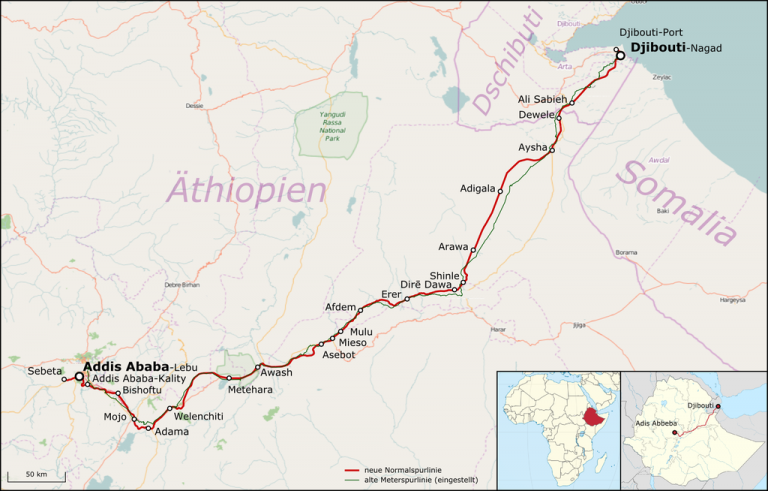
(Next) Naturally, this is the Djibouti-Addis Ababa railway, which was built with Chinese help; it’s 750km long, and it now allows also to bring food aid to areas which are hit by drought which was not possible before. And this is just the very beginning. China also has developed a China-Africa Development Fund, which is financed by the China Development Fund, and also many of the other state banks of China have been involved in direct investments. Over the last decade, China took part in the creation of more than 100 industrial zones, 40% of which are already operational. They have helped to build 5,756km of railway, 4335km of motorways, 9 ports, 14 airports, 34 power stations, 10 large and 1,000 small hydroelectric power stations, and by the end of 2016, it had this number.
This coming September, there will be a big China-African Union summit which obviously will take this relationship to a new level.
There is a fundamental change, because previously the Western countries refused to invest in a real way in Africa, but with the second largest economy of the world, there is now the chance for African nations to replicate the Chinese model of development, each in their own African way. But nevertheless, in terms of the infrastructure and industrial development they can take China as a model, which after all, in the last 40 years had an incredible transformation, from being a very, very underdeveloped country, to now being an absolutely breathtaking, dynamic economy.
This is the positive side. On the other side, we are confronted with unprecedented challenges: Terrorism, financial turbulence, migrants, and a large percentage of the 68.5 million refugees worldwide are migrating from Africa, trying to get through the Sahara, many of them dying of thirst; or drowning in the Mediterranean, where in the last years, thousands if not tens of thousands of people have drowned.
Since the refugee crisis escalated in Southwest Asia and Africa in 2015, it became very clear how deeply disunited the European Union is. And especially in the recent weeks there was a total government crisis in Germany, which nearly ended the political career of Chancellor Merkel. There was demonstrated a complete erosion of the EU: No unity, no solidarity, tensions between France and Italy, total tensions between Eastern Europe and Western Europe. And it is also very clear that they could not come up with any solution, because all they could propose at the recent EU summit was a complete brutalization of the migrant issue: They want to militarize Frontex, to supposedly keep the refugees out of the EU, which is sort of a maritime border police, and there were event proposals to use the German army or even NATO, to put the refugees into “disembarkment camps,” as they call them, either within Europe or in North African states, all of which already have rejected to be the hosts of such camps.
And Pope Francis has compared these camps to the concentration camps of the Nazi period.
So, what has happened to “Western values”? What about human rights? What about democracy? These are barbarian proposals, and they’re not only inhuman, but they also will not work. They will not work: They all the time talk about that one needs to look at the root causes for the refugee crisis, but they never do.
So, I have a proposal how this can be changed: I call it the “Singapore Summit model.” We all have witnessed the very historic summit between President Trump and President Kim Jong-un of North Korea recently in Singapore. And it is very clear that it {is} the New Silk Road Spirit which has changed the environment in Asia, which made this summit possible in the way it took place, and it is also an example of how you can change, within a few months, a relationship of complete adversity and the potential trigger of a large nuclear war, which was the situation between the United States and North Korea, and turn it into cooperation. This agreement now includes the denuclearization of North Korea, in exchange for the promise from the United States, China and Russia to help to develop North Korea economically, and turn it into a prosperous nation.
My proposal was that the EU should have changed the agenda of their just-concluded summit, invite Chinese President Xi Jinping, and the African heads of state who already have successfully cooperated with China; and then present a comprehensive crash program for the development of the infrastructure in Africa. (Next slide) Where the presence of Xi Jinping would give this credibility, because China has delivered on development, and the idea would be to present such an integrated, continental transport plan, a trans-African transport network, which already has been proposed by Foreign Minister Wang Yi in 2014, and reiterated in 2016.
If these leaders, the Europeans, the Africans, and the Chinese leader would say that it is our intent to make a crash program for such a development, then this would be a signal to the young people now running away, risking their life in drowning in the Mediterranean, or ending up in a concentration camp, to participate in the economic buildup of their own country.
At the recent visit of French President Macron in Ghana, Ghana’s President Nana Addo Dankwa Akufo-Addo basically told Macron that, we don’t need your development aid crumbs; what we need is a real investment. And he called on the youth that they should not try to get to Europe, but that this energy these young people have should be used to build up the country. This would require training centers, very much like what Franklin D.
Roosevelt did with the New Deal, the CCC program, training especially young people in the Civilian Conservation Corps; and then, such a summit, making such a declaration of intent, could be like the Singapore Summit, a complete turnaround.
I think we have to use, also, Xi Jinping’s notion of “sustainability.” Not to mean “appropriate technologies,” which in reality means no technology, and not sustainability which means only green solar and wind, but it means total infrastructure and industrialization as the new definition of sustainability.
African nations do not have to repeat all the levels and phases of the industrialization of the Western countries, but like China they can leapfrog to the most advanced technologies, such as focussing on high-speed trains, on magnetic levitation, on the fourth generation nuclear power. Party of this plan should be, first, a regional infrastructure investment bank, like the AIIB for Asia,— like an African Infrastructure Investment Bank—and that should be parallelled with national credit mechanisms, or national banks, to have the internal financing of the infrastructure.
Secondly, there should be an integrated network of high-speed trains, waterways between rivers and lakes, the full development of hydropower projects, the fourth general of nuclear electricity generation, and desalination of large amounts of ocean water for irrigation. Also, as the Ambassador of Ghana already said this morning, there should not be the export of raw materials, at least not only, but high-end petrochemical and metallurgy, semi-finished and finished products upgrade the value chain in the country.
In addition, there should be a Green Revolution, not in the sense of the Greenies of Europe, but in the sense of the Green Revolution of Jawaharlal Nehru, who transformed the agriculture of India in this way. You need disease- and drought-resistant plants, modern food-processing, and addition, you need certain large-scale projects, such as (next slide) the tunnel through the Strait of Gibraltar which is an eminently doable project, because a feasibility study has already been concluded; a state treaty between Spain and Morocco does exist, so one could start to build this immediately. Also, a bridge or a tunnel, as we see in the picture on my right, between Sicily and Tunisia, which could be built, with a couple of islands in between, and integrate the European development with that of Africa. And naturally, also a high-temperature reactor in South Africa should be promoted.
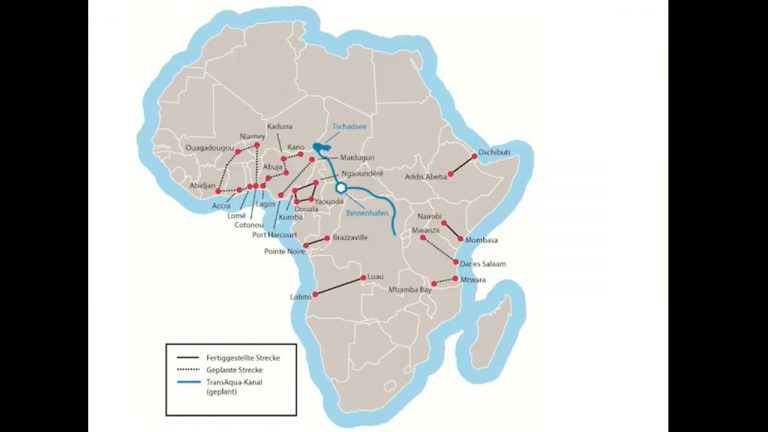
(Next slide) The biggest infrastructure project ever, in the history of Africa, is Transaqua. In February of this year, there took place a big conference in Abuja, with the presidents of all of the countries of the Lake Chad Basin, who concluded that the only way to save Lake Chad, which now has dried out to about 10% of its original size, and fill it up through the water from some of the tributaries of the Congo River, from a 500 meter height, and then, through gravitation, you could bring this water all the way to Lake Chad, and not only have an inland shipping lane for all the participating countries, hydropower, large amounts of water for irrigation and refill Lake Chad. This would transport up to 100 billion cubic meters of water annually, and as I said, Lake Chad would again have the size of 25 square km — now it’s only one-tenth of that. This has been adopted by this Abuja conference and then a treaty was concluded between PowerChina, which is a large, Chinese engineering firm — which is famous for having built the Three Gorges Dam, so they are very knowledgeable and experienced in making such big projects together with the Italian engineering firm Bonifica. The Italian government at that conference, announced that they are paying EU1.5 million to have a feasibility ready in one year; and this is also a perfect model for a tripartite cooperation among African nations, China, and in this case, a European nation, Italy.
This will be not a long-term project. The leading engineer of PowerChina announced at the conference that they are confident that they can finish this project in 12 years, and it will be an industrialization in the heart of Africa which can have complete transformational character.
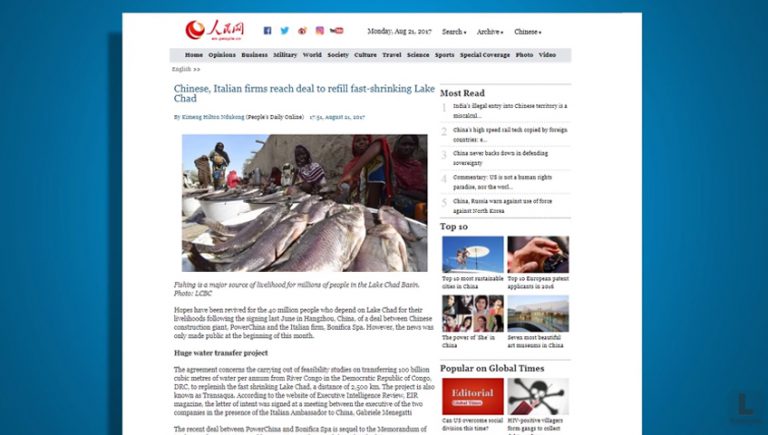
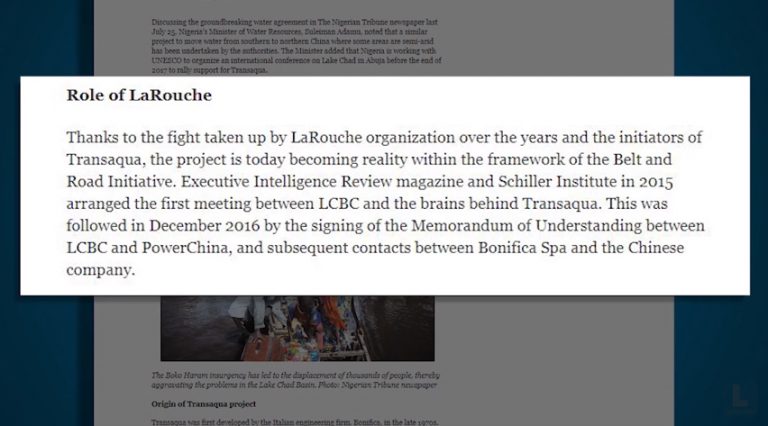
(Next) People’s Daily already last August wrote an article about this, giving credit for this Transaqua project to the LaRouche movement and the Schiller Institute, because, we over the last three decades worked in many conference, advertising this to many people, and finally got the connection between PowerChina and Bonifica; and it’s now a state treaty between China and Italy. (Next) They emphasize in particular the role of our efforts in that.
This is, as I said, one of the results of our decades’ long work to help to industrialize Africa. (Next) This is a book which has a total plan for the industrialization of Africa which we already wrote in 1976, and this book was published in 1978.
So as you can see, this is not pouring from the heaven, but this movement, from the very beginning of the ideas of my husband, Lyndon LaRouche, stood for the industrial transformation of the southern hemisphere, simply because it’s the only way how you alleviate poverty, and create a good living standard for all the people.
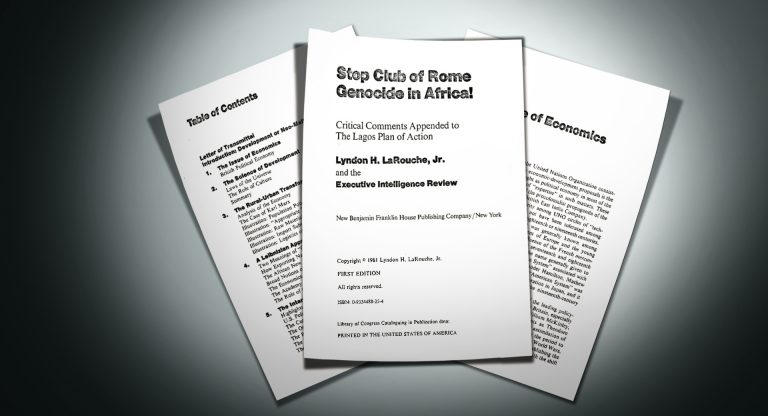
(Next) In 1980, with the Lagos Plan of Action was published, my husband wrote a commentary to it, which already then was a very important conceptual approach how to tackle this problem of underdevelopment, by creating a continental infrastructure plan, new cities, science cities, and the education of the youth in particular. And we campaigned for this, for over really four decades;

(Next) The total work of this went into “The New Silk Road Becomes the World Land-Bridge,” which we published in 2014, after Xi Jinping announced the New Silk Road. And just about one week ago, we put out the World Land-Bridge report second edition, which has an updated plan for how to do this.
We conducted many conferences in Sudan, for the five countries around the Nile, how they could work together on development. And I also addressed an economic summit in Abuja in 1997.
In Europe we conducted many campaigns with the headline “The Future of Europe Lies in Africa.”
I think the application of the Singapore model is quite possible: Because the new Chancellor of Austria Sebastian Kurz, who is for one-half year the president of the European Union Council, has announced that he wants to conduct an EU-Africa summit before the end of the year. Now, Austria, while having a hard line on the migrants, on the other side, has in their coalition document of the two coalition parties in the government, a whole chapter that Austria wants to become the hub for the New Silk Road. And there are also many Central and Eastern European nations, Balkan nations, Southern European nations that all want to be the hub — for example, Spain and Portugal want to be not only the terminus of the Eurasian Silk Road towards the West, but they want to be the hub to the Portuguese- and Spanish-speaking countries around the world.
If they all cooperate on the New Silk Road this would be the way to do this, and since the refugee crisis will not go away, until you change, fundamentally, the policy towards an industrialization of Africa, I think this crisis can be turned into an chance. What the Schiller Institute is doing right now, and I would encourage all of you to help and do the same, is to have a full mobilization of all European nations and in Africa, which agree to actually put pressure on behalf of this perspective; and present the EU at this upcoming summit with the concrete outline of the necessary investments, with the participation of China, but also involve other countries, like India, Japan, even the United States, and do likewise. That if one approaches it like China — China builds a high-speed train, and I saw it with my own eyes, from Lanzhou to Urumqi in half a year — by doing it, by not simply building it one step after the other, but by starting to build it at 10 different places or even 20 different places. (Next slide) So if you had such a concrete plan you could start building it at many places at the same time.
We have outlined what projects could be in these two reports — we published one full report which is called “Extending the New Silk Road to West Asia and Africa,” which has many of these projects in it.
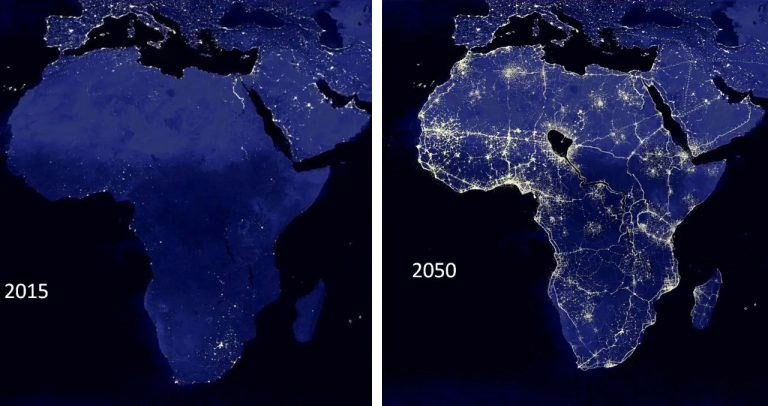
(Next slide) The left picture is, if you look at the electrification by night, this is how Africa is now. If one would go in the direction I just suggested, to extend the New Silk Road to Africa through a collaborative effort of all nations, then the African night sky could like the righthand picture, which is about equivalent of what you would see in the United States or Europe.
So, I think that this would turn Africa into a modern, prosperous continent, where all citizens would enjoy a safe, and happy and long life. So if we all act together in the spirit, Africa will be the new China with African characteristics.
Feb. 16 – GBTimes is a multimedia news site, based in Finland where it was founded by Chinese entrepreneur Zhao Yinong, and which refers to itself as a “bridge between China and the rest of the world.” It published the following interview with Helga Zepp-LaRouche on Feb. 16:
China’s ambitious plan to link itself with Europe and Africa through new Silk Road trade routes has so far received a mixed welcome in Europe. The Belt and Road initiative, the brainchild of Chinese President Xi Jinping, proposes to boost trade and economic integration across Eurasia through over $1 trillion worth of investments in railways, ports, power plants and other infrastructure links. The initiative has been officially endorsed by Central and Eastern European countries, many of which are hoping that Chinese investment could create jobs and improve infrastructure.
But Western European countries have been more cautious, with British Prime Minister Theresa May declining to sign up to the initiative during her recent trip to Beijing and French President Emmanuel Macron warning during his trip to China that the New Silk Road cannot be “one-way.” There are also concerns in Brussels about a lack of reciprocity in trade with China and increasing Chinese investment in critical infrastructure in Europe.
The German-based Schiller Institute, however, has for the past several years been campaigning for the Belt and Road initiative in Europe by organizing hundreds of conferences on the topic. Helga Zepp-LaRouche, the institute’s founder and president, talked to gbtimes.com about the initiative and why she believes Europe should embrace it.
Q: What is the Schiller Institute?
HELGA ZEPP-LAROUCHE: The Schiller Institute was founded in 1984 as a think tank, with the main idea behind it being that peace and order in the world would only function if each nation would relate to the best cultural tradition of the others and vice versa. One of the focuses was to fight for a just new world economic order, something like in the tradition of the Nonaligned Movement, especially inspired by the ideas of my husband, Mr. Lyndon LaRouche, and secondly to fight for a renaissance of classical culture. I gave it the name of [German philosopher] Friedrich Schiller because his image of man was the most noble and beautiful one and I thought such a conception was urgently needed in the political realm.
Q: How did you first get to know China?
ZEPP-LAROUCHE: I went to China for the first time in 1971 on a cargo ship, which was repaired in Shanghai. So, I had plenty of occasions to visit many factories, children’s palaces, and the countryside. I also went to Shenzhen, Qingdao and Beijing, and that left a very lasting impression on me because this was in the middle of the Cultural Revolution (1966-1976) and China was very much different then. But it started a deep interest on my side in Chinese philosophy and culture. And then I was also inspired by the changes which took place in China after the reforms of Deng Xiaoping, and I visited China many times in the 1990s and the 2000s, and especially after Xi Jinping announced the new Silk Road. And I could see the dramatic changes and the economic miracle which China has undergone. I feel very privileged that I have sort of personally witnessed the unbelievable transformation of China over almost 50 years.
Q: You mentioned President Xi Jinping who proposed the Belt and Road initiative in 2013. The Schiller Institute has been very supportive of this initiative. Why is this?
ZEPP-LAROUCHE: First, the Belt and Road initiative is presently the most important strategic initiative on the planet because it proposes what Xi Jinping calls a community for shared future of humanity. The idea of one humanity is a perfect conception for overcoming geopolitics, which was the reason for two world wars and, in the age of nuclear weapons, can lead to a terrible catastrophe just as big. If you look at the incredible progress this initiative has made in the five years since it was announced, you already see a tremendous transformation where the developing countries in Africa, Latin America and Asia, for the first time, have legitimate hope to overcome poverty and under-development. It just happens that the Belt and Road initiative is very much in accordance with proposals my husband and myself have made during the last decades. After the Soviet Union disintegrated in 1991 we proposed something that we called the Eurasian land bridge, which was the idea to connect the Eurasian peoples and industries through development corridors. The Chinese government picked up on the proposal to organize an international conference in Beijing in 1996, in which I participated as speaker. Already at that point China considered the development of the Eurasian land bridge a strategic initiative, but this was put on hold due to the Asian financial crisis of 1997. We were then extremely happy when Xi Jinping announced this policy in 2013 — with China’s economic power all these plans can now be realized. Why do you think the Chinese are interested in this idea of bridging the Eurasian continent? China has developed its own economic model of lifting its population out of poverty and it also wants to contribute to eliminating poverty on the world scale. I think that is a very different approach to many other countries. There are now only 30 million poor people left in China. In comparison, there are 90 million poor people in the European Union and more than 50 million people who are officially poor in the United States, but no clear plans to eliminate poverty in totality. So, you are saying China is currently the only major country that has a global vision? Yes. I participated in the Belt and Road forum in Beijing last year and everyone who participated in this conference had a distinct impression that we were witnessing the beginning of a new era of mankind. At the 19th National Congress of the Chinese Communist Party, Xi promoted the goal of having a fully developed, modern, culturally advanced, happy country by 2050 — not only happiness for the Chinese people, but for all the people in the world. Normally politicians in the West think at best until the next election, and I have not heard from any Western leader a plan on how to uplift the entire human species in the next 30, 40, 50 years. The idea to create happiness for the people as a policy goal was last heard during the American revolution when it was set in the American Declaration of Independence that it is a fundamental right to have life, freedom and happiness. This is a notion coming from Latin [sic — she said Leibniz] and it means the ability of people to develop their full potential. I have seen in China on many occasions that people really think that way. They have the idea that there is no limit to their ability to self-perfect to improve society and relations between nations, and it’s a completely different spirit to what you find anywhere in the West.
Q: All Central and Eastern European countries have officially joined the Belt and Road Initiative, but many Western countries including the U.K., France and Germany have been more cautious about it. Why do you think this is the case? ZEPP-LAROUCHE: When certain politicians in these countries say they want to insist on standards and rules, and that they don’t want the spreading of Chinese investment in Europe, I think it’s a question of geopolitical control. The EU for example could have developed Central and Eastern Europe, the Balkans, but they didn’t. When China then comes and starts to build the kind of infrastructure that the EU did not build, these countries are happy and want to go with the new Silk Road. And that causes some people who believe in geopolitics to see it as a threat. The present Western system is based not on the common good as a primary orientation, but on monetarist profit-making. This system benefits those who speculate and those who run the banking system. But it leads to such things like the 2008 financial crisis, which was a systemic crisis, and nothing has been done since other than quantitative easing and pumping money.
Q: But do you think China itself has overcome geopolitics?
ZEPP-LAROUCHE: I know that that is not the view of many politicians in the West, but I think assumptions about China are just people’s projections of what they themselves think. I am not a naive person — I have studied this in depth and looked at it closely — and I do think that China does not plan to dominate the world with its system. The Chinese model is more attractive, and many countries want to repeat what it has been doing, but I don’t think China wants to impose its values. My explanation for this is China’s Confucian tradition. For example, Christians are supposed to win other people over to Christianity, but Confucianism does not do that. Confucianism is perfectly happy to live in coexistence. And if you look at the entire history of China, you never had religious war. You had Buddhism, Confucianism, Taoism and Christianity all living in a perfect ecumenical harmony. So, I think in Chinese history, you don’t find anything which would give credibility to the claim that China is not doing what they say. I think they are doing exactly what they say they are doing and they mean it.
Q: What would it mean for Western European countries to join the Belt and Road Initiative?
ZEPP-LAROUCHE: It would mean that there would be a shift towards the real economy. Right now, you have this money-makes-money philosophy, but if you look at even an advanced country like Germany, there’s a tremendous backlog in infrastructure. There are warnings by some of the logistic organizations that Germany is about to lose its standard as a location for industrial development because of the collapse of the infrastructure. So, if European countries would join the new Silk Road it would mean that they could basically renew their infrastructure like China has done, and to build fast trains among all major cities. With the policy of the Troika [European Commission, European Central Bank and International Monetary Fund], the industries and the economies of the Southern European countries were destroyed. Now you see that with the advantages that come from Chinese investment in the Piraeus port and other projects in Greece, it’s going upwards. And with the EU, it went downwards. The same is true for Italy, Spain and Portugal. Europe could also participate with China in the reconstruction of Southwest Asia, of Syria, of Iraq, because you must bring economic development to these countries if terrorism is supposed to be eliminated. You have to give young people a future which they don’t have right now. It would mean you could solve the refugee problem in a human way.
Q: But do you think that some Europeans might be cautious about the growing Chinese influence because they think they might have to someday accept the same kind of restrictions on freedoms that China has at home?
ZEPP-LAROUCHE: Yes, but if people are worried that they may lose some of their hedonistic impulses — well, that might not be altogether such a bad thing. Because what we are seeing right now is a decadent society with all the violence, pornography and drug addiction. You have an opium epidemic in the United States, which is contributing to the fact that life expectancy is going down for the first time. If there is any parameter for the functioning of an economy, it is the life expectancy. If an economy is doing well, it’s increasing and obviously it’s an indicator that there is something fundamentally wrong if it’s going down because of suicide, alcoholism and drug addiction. On the other hand, there was just a poll made in Germany among 42 firms which were taken over by Chinese investors. In all cases, the management and the employees said that it was a positive thing that the Chinese took over, instead of speculators or hedge funds. I think some of these changes that come with more Chinese investment and influence would be beneficial. I would even go so far to agree with Leibniz, who said already in the 17th century that because of the superior morality of the Chinese, one should import Chinese missionaries to teach morality to the Europeans.
Q: So, you are optimistic that the acceptance of the Belt and Road initiative is growing in Europe eventually?
ZEPP-LAROUCHE: We have found that all people who do business in China or who have travelled to China or who are married with a Chinese person, are all positive, and they know that what China is doing is a historic transformation of humanity. The Belt and Road initiative is not just about economics; it’s not just about infrastructure from A to B, but it is really a new paradigm. And what I mean by new paradigm is a new way of understanding what is the role of humanity. We are the only creative species who can invent new technologies and sciences and change the mode of our existence. It’s not the nature of man to be greedy, to chase for stock market gains and try to exploit and dominate others. It’s the nature of man to develop our own potential to the fullest so that we can contribute to the development of the human species. And the new paradigm will be that more and more people, as time goes by, will be able to realize their true potential as human beings.
https://gbtimes.com/interview-with-helga-zepp-larouche-on-chinas-new-silk-road-and-europe
On June 24, 2020, the following statement was issued today by Helga Zepp-LaRouche, Founder of the Schiller Institute.
Vladimir Putin’s detailed and very straightforward article on the background to the Second World War, which he substantiates with important historical documents, and his speech to the June 24 military parade in Red Square to commemorate the 75th anniversary of the Soviet victory over fascism, are urgent must-reads for every politician and politically aware person around the world. At the same time, one should definitely watch the entire military parade, but keep in mind that the overwhelming majority of the Russian population had already read Putin’s article as they followed the parade on television.
What comes across is an approach to understanding why May 9 is the most important holiday in Russia, and that the same almost superhuman determination that enabled the Soviet population to survive the barbaric attack by the Wehrmacht and to achieve victory over Nazi Germany despite the loss of 27 million people, still exists in Russia today. But Putin also extends an olive branch to the West by calling on all countries to publish the still secret historical documents from before and during the Second World War, and to use them together with the testimonies of contemporary witnesses to launch a truth-seeking debate among historians. Reflecting on why World War II came about should cause political forces in the world today to draw the necessary lessons and rudely awaken the world to the escalating war danger so as to avoid repeating the same mistakes.
Given the gigantic destructive power of the two world wars of the 20th century and the almost certainty that mankind would not survive a third world war, this time thermonuclear,, it is useful to realize the point at which these world wars could no longer have been prevented. Putin answers this question very clearly regarding World War II by saying that it was the “Munich Betrayal” as the Russians truthfully call it—called the “Munich Pact” in the West—that triggered the war.
Putin’s article also responds to various historical misrepresentations, such as the European Parliament’s declaration of September 19, 2019, which gave equal blame to the Nazis and the Soviet Union for the Second World War, or numerous accounts that mention all the participants in the anti-Hitler coalition with the exception of the Soviet Union, or the claim that it was primarily the United States and Britain that defeated the Nazi war machine. There is no longer any public awareness in the West of the fact that the Soviet Union, in reaction to the blitzkrieg attack carried out with never before seen destructive power by the Nazis on June 22, 1941, carried out an unprecedented evacuation of people and production facilities to the east. Within a year and a half, the Soviet Union had surpassed the military production of Germany and its allies.
As quoted in the 1945 report by the International Reparations Commission headed by the Russian diplomat, Ivan Maisky, the number of soldiers deployed by Germany on the Soviet front was at least ten times greater than on all other allied fronts, four fifths of the German tanks were deployed there, and about two thirds of the German aircraft; in total the Soviet Union accounted for about 75% of all military operations. Roosevelt’s Fireside Chat presentation to the American people on April 28, 1942 is quoted: “These Russian forces have destroyed and are destroying more armed power of our enemies—troops, planes, tanks and guns—than all the other united nations put together.”
Moreover, Churchill wrote in a letter to Stalin on September 27, 1944, that “it is the Russian army that tore the guts out of the German military machine.” Putin expresses gratitude for the efforts of all the countries and peoples who fought on different fronts and the eventual support of the Allies for the Red Army through the provision of ammunition, food and equipment, that accounted for seven percent of the total military production of the Soviet Union. It follows that one of the most important corrections to be made in the accounts of the Second World War is to emphasize, contrary to what is done today, the outstanding role of the Soviet Union in the victory over fascism.
Putin makes a clear distinction throughout between the German population and the National Socialists, who skillfully exploited the intention of the Western allies to rob Germany under the conditionalities of the Versailles Treaty and drove Germany into a new war. He notes that the Western states, especially political forces in the United Kingdom and the United States, directly or indirectly made this possible; certain financial and industrial circles invested very actively in German factories that were producing military products, and there were many supporters of extreme right-wing nationalist movements among the aristocracy of western nations and political establishments.
One could add to that that Hitler was extremely “socially acceptable” in these same circles: The New York Times fully supported Hitler until 1938, and Time magazine declared him “Man of the Year” that same year. What Putin states only summarily here, has been documented in great detail by Lyndon LaRouche and authors associated with him—from the support for Hitler coming from Averell Harriman and Prescott Bush to that of Montagu Norman, head of the Bank of England, as well as the American eugenics movement’s open support for the Nazis’ racial teachings. Prescott S. Bush’s banking partner Fritz Thyssen, in his 1941 book I Paid Hitler, openly admitted that he was Hitler’s most generous supporter. Putin also mentions the deliberate setting of arbitrary borders under the Treaty of Versailles (one could add Sykes–Picot and Trianon), which were intended to be time bombs for geopolitical manipulation.
Putin hits a particularly sensitive point when he addresses the fact that politicians in the West do not like to be reminded of the Munich Pact, in which under the guise of an appeasement policy, the booty was divvied up. Czechoslovakia was betrayed by its allies France and Great Britain, and war between Germany and the Soviet Union was in principle pre-programmed. It was absolutely clear to the British and French geopoliticians that “Germany and the Soviet Union would inevitably clash and bleed each other white,” Putin writes.
Documents are also cited that show how the British and Polish sides tried to prevent the formation of an anti-Hitler coalition, and that the signing of the Non-Aggression Pact, which in fact made the Soviet Union the last country to sign any such treaty with Germany, took place against the backdrop of the real threat of war against the Soviet Union on two fronts, as Japan was already involved in fierce fighting on the Khalhin-Gol River.
That France and Britain clung firmly to their plan to have Germany and the Soviet Union destroy each other, became even clearer when, after Hitler’s invasion, neither country came to Poland’s aid at all, moving militarily a few kilometers into German territory, to give the appearance of warlike activity, a farce called the “phony war” (Sitzkrieg in Germany and drôle de guerre in France). Putin quotes General Jodl during the Nuremberg Trials saying that Germany did not lose the war as early as 1939, only because the 110 or so French and British divisions, which were up against 23 German divisions in the West, remained completely idle during the war with Poland.
It will not please those in the West who have been writing a revisionist history of the Second World War, and its prelude, for some time now, but Putin has outlined in this article the essential process of these maneuvers that created the greatest catastrophe in history to date. He is now calling on all states, each of which is to blame in varying degrees because of their geopolitical interests, to cooperate in this historical reappraisal. Each believed they could outsmart the others, as Putin writes. But in the end, it was the short-sightedness of refusing to create a system of collective security, that sealed the road to the great war.
Putin’s call to create a comprehensive archive of the history of World War II, and the pre-war period, in which all film and photographic material, all documents already published and documents yet to be released would be available to historians, must be realized without delay.
I have been deeply convinced for a long time that the German population, for example, will never gain internal freedom and their sovereignty until they understand that Hitler and the Nazis were not a purely German phenomenon, but a project that was supported for geopolitical reasons by British and American circles. For this reason, I published The Hitler Book back in January 1984, which goes into some of the background that led to the Nazis, one among the many tendencies of the Conservative Revolution which was supported by the international oligarchy.
Such a public international debate is also urgent because thinking people can quickly recognize the parallels to politics today. The plan at that time, which was to let Germany and the Soviet Union bleed each other white, is now a plan to encircle Russia and China, and to bring about regime changes against the governments of both of nations, and in the United States it is the ongoing “Maidan” against President Trump, who waged his 2016 presidential campaign with the pledge to establish a good relationship with Russia, and who was building, at the beginning of his Presidency, a good relationship with China.
President Putin ends his article with a reference to the summit of the five permanent members of the UN Security Council, which he has proposed, and which the other four heads of state have already agreed to. This summit, he says, should frankly discuss, among other things, issues of preserving peace and in particular, of overcoming the economic crisis which has been exacerbated by the coronavirus pandemic. How severe the impact of the pandemic will be, he points out, depends decisively on the ability of these countries to work together, as real partners, in an open and coordinated manner, and to revive those high humanist ideals and values for which their fathers and grandfathers fought shoulder to shoulder.
Such a summit must be supported by all peace-loving nations and people, because only the combination of the United States, Russia and China can implement the needed reorganization of the hopelessly bankrupt financial system through a new Bretton Woods credit system, and hopefully, the desolate state of the world will convince France and Great Britain that they have to give up their colonial and imperial traditions.
Vladimir Putin’s initiative to use the 75th anniversary of the end of the Great Patriotic War to launch an international discussion about the historical truth of the causes of World War II is a brilliant flank, which may possibly prevent the world from sleepwalking once again into a new world war.
Schiller Institute founder Helga Zepp-LaRouche made the following comments on Jan. 16, 2018.
Concerning the controversies around what President Trump did or did not say, we absolutely have to remain on the high ground, which means emphasizing Lyndon LaRouche’s “Four Laws” and that the United States must join the New Silk Road.
Now, what that actually means is that it should be obvious to anybody that you cannot solve the problem of immigrants in the United States, or the drug epidemic, without bringing development to the Central American and Caribbean countries in particular. There are many places which are not “shitholes,” but they are hellholes. For example, according to the FAO the level of chronic undernourishment, ie hunger, in Sub-Saharan Africa is 22.7% of the total population, which is the worst in the world. The second worst region is the Caribbean, where it averages 17.7%. But in Haiti}, an absolutely unbelievable 47% of people have permanent hunger, and 80% are living in poverty. And the whole Caribbean is very far from being a luxury cruise paradise: for the people living there, it’s a complete hellhole, as is most of Central America. [See Figures 1 and 2, which compare select physical-economic parameters of Haiti and El Salvador with Spain.]
The only way you can address that is, obviously, what China is already actively doing with their Belt and Road Initiative, for example in Panama, where they are now building a high-speed railroad from Panama City to the border with Costa Rica. And China is also the only country which is seriously helping Haiti, announcing a $5 billion plan to rebuild Port au Prince, the capital of Haiti.
So this requires the whole Belt and Road Initiative, not just one project or two. China has proposed on the highest level for Spain and Portugal to be bridges for the Belt and Road to Ibero-America and the Caribbean, and both Iberian governments have already agreed that they do not just want to be the western end of the New Silk Road, but they want to actively be the bridge to the Spanish- and Portuguese-speaking nations in Ibero-America and also in Africa.
We are working right now on writing up this whole question of extending the New Silk Road into all the Americas, as part of our updated global study on “The New Silk Road Becomes the World Land-Bridge:” to build a high-speed railroad from the southern tip of Ibero-America, Chile and Argentina, all the way through the Darién Gap and the Bering Strait, connecting with the Eurasian infrastructure program (see Figure 3).

Figure 3
Now, one of the big problems there, is a geopolitical leftover that a number of Central American and Caribbean countries still have diplomatic ties with Taiwan and not with the People’s Republic of China. Panama recently switched that and agreed to support the One China policy, and obviously this is a big concern for the Chinese, who are constantly confronted with efforts to not recognize the One China policy. As a matter of fact, they recently complained that Marriott Hotel and other firms are talking about Macau and Hong Kong and Tibet as “other countries,” as if they would not belong to China. So this is a question of accepting the sovereignty of China, which obviously has a lot to do with how they respond.
The situation is economically so severe that you cannot just try to build up from below, but you have to leapfrog and get the productivity level of this whole region up by orders of magnitude. There are obvious angles. For example, you have in French Guiana, which is actually not a sovereign country but a colonialist department of France to the present day, the European Space Agency’s launch site in Kourou, which is very close to the Equator. But then you also have the Brazilian Space Agency’s launch site, in a place called Alcantara, which is even closer to the Equator. These situations are not without problems, but they already represent a very important scientific capacity, and that could be made into a regional project, a science-driver for the entire Caribbean Basin region (see Fig. 4).

Figure 4
Then you have the expanded Panama Canal, the planned Nicaragua Canal, and, as Lyndon LaRouche has often stressed, if you build all of these canals, including the Kra Canal in Thailand, you are really talking about a single world ocean, which would eliminate many of the geopolitical chokepoints of the British.
So we have to really push this, that the United States must join the New Silk Road. This would include building major projects in hurricane-ravaged Puerto Rico, including in Ponce on the southern coast of Puerto Rico, which could become a major port and shipping point for the Maritime Silk Road. Building a deep-water port there would open the whole transport corridors into the Gulf and East coasts of the United States. Connected with that, the Maritime Silk Road would do something similar in Mariel, Cuba, where there is also the plan to build a deep-water port. And since this is very close to the United States, it should all really be integrated into one big project.
Helga Zepp-Larouche Participates in the Beijing Belt and Road Forum for International Cooperation
‘We are in a phase-change for humankind!’
May 15 — Helga Zepp-LaRouche, founder and president of the International Schiller Institute, is right in the middle of the action in Beijing during the Belt and Road Forum for International Cooperation. This comes after decades of leadership by Lyndon and Helga LaRouche for just this kind of mobilization for worldwide development. Since the 1990s, and Zepp-LaRouche’s first participation in an international conference in China, where she called for a “Eurasian Land-Bridge,” she has become widely known as the Silk Road Lady.
Representing the Schiller Institute, Helga Zepp-LaRouche spoke on May 14, on the first day of the B&R Forum, on the panel, “Belt and Road for Facilitating Strong, Balanced, Inclusive and Sustainable Global Economy.” She said, “The Belt and Road Initiative has the obvious potential of quickly becoming a World Land Bridge, connecting all continents through infrastructure, such as tunnels, bridges, reinforced by the Maritime Silk Road. As such, it represents a new form of globalization, but not determined by the criteria of profit maximization for the financial sector, but for the harmonious development of all participating countries on the basis of Win-Win cooperation.
(Xi Jinping opening speech: Video & Transcript)
“It is therefore important, that one does not look at the BRI from the standpoint of an accountant, who projects his statistical viewpoint of cost-benefit into the future, but that we think about it as a Vision for the Community of a Shared Future. Where do we want humanity as a whole to be in 10, 100, or even in a 1000 years?” Is it not the natural destiny of mankind, as the only creative species known in the universe so far, that we will be building villages on the moon, develop a deeper understanding of the trillions of galaxies in our universe, solve the problem of–’til now–incurable diseases, or solve the problem of energy and raw material security through the develipment of thermonuclear fusion power? By focusing on the common aims of humanity we will be able to overcome geopolitics and establish a higher level of reason for the benefit of all.”
In particular, Zepp-LaRouche addressed the question of the role of the United States, whose delegation in Beijing was led by a special adviser to Pres. Trump. Presenting the most positive, ‘big picture,’ Zepp-LaRouche explained, “Looking at the world land map, the United States is not merely a country surrounded by two oceans and two neighbors, but can be a center part of an infrastructure corridor which connects the southern tip of Ibero-America, through Central and South America, with the Eurasian transport system via a tunnel under the Bering Strait…”
Predictably, the geopolitics crowd, centered in London, is having a fit. The Economist in London today ran a stream of bilge, headlined, “The Economist explains, “What Is China’s Belt and Road Initiative?” They write that businessmen in Central Asia call it the “One Road, One Trap,” because B&R projects are unreliable. And “the Belt and Road Forum has an unfortunate acronymn, BARF,” etc.
But back in reality, not only does the Belt and Road Forum mark the process of potential world economic and scientific lift-off, but there is a vital process underway of deliberation over points of immediate suffering and possible all-out war. President Trump’s envoy in Beijing, Matthew Pottinger, is now in South Korea for consultations over concerns in the region. On Syria, as peace talks start on May 16, called “Geneva 6,” numbers of meetings are set for this week, of Mediterranean leaders who met in Beijing with both Xi and Putin. In Washington, D.C., May 16, Turkish President Recep Tayyip Erdogan will meet with President Trump. On May 17, in Sochi, Italian Prime Minister Paolo Gentiloni will meet with Putin. Likewise, Greek Prime Minister Alexis Tsipras met in Beijing with Xi, Putin, and also with Russian Foreign Minister Sergei Lavrov.
Today Helga Zepp-LaRouche summed up the great potential–our great challenge–by describing the May 14 opening of the Belt and Road Forum: “Yesterday was a fantastic, historic moment!” She was speaking on China Global Television Network’s “Dialogue with Yang Rui” program, run live, prime time. She exclaimed, “We are in a “phase-change for humankind!”
Helga Zepp-LaRouche on CGTN ‘Dialogue’
May 15, 2017
Helga Zepp-LaRouche is a feature guest in a program “Dialogue” on CGTN, 24-hour English news channel of China Central Television (CCTV), based in Beijing, on the eve of “the Belt and Road Forum” held on May 14 – 15 in China.
Q. What do you make of China’s global ambition?
Helga Zepp-LaRouche: I think it’s very important strategic initiative because it’s the only way how you solve all problems–regional, cooperation, underdevelopment, poverty. It’s really a historic mission. I cannot see anything else, not from the United States, for sure, not from Europe and so I’m really optimistic. I think yesterday was a fantastic, historic moment.
Q: But, do you think China is ready?
Zepp-LaRouche: Oh, I think so. First of all, the Chinese economic miracle of the last 30 years has surprised the world. And now through the Belt and Road Initiative, China is offering to export that model of development to other countries. And if you look at the success of the Belt and Road Initiative in the last four years, it is absolutely breathtaking! And I am shocked — every day the Chinese government comes up with a new initiative, which offers a solution to a problem. And it’s just very attractive idea. This is why so many countries want to be part of it. It’s much more attractive to have win-win cooperation in the context of the New Silk Road than to be part of a military alliance, which just gets countries into trouble. So this is why the whole center of power has completely shifted to Asia. And I am convinced that yesterday we experienced the formation of a new world economic order. It was a truly historic moment, and I think most of the participants at the Belt and Road Forum had that profound sense of being in the middle of making history for a new era for civilization. And I am very excited because this is a phase-change of humankind. I think we are on the verge of…
Yang Rui: No wonder President Xi Jinping calls the Belt and Road Initiative the project of the century.
Q: [India says] Hey, the Sino-Pakistani economic corridor will somehow go through the contentious territorial area of India, Kashmir; therefore, they refuse to get involved with the Belt and Road Initiative. The spokesperson of the Indian Foreign Ministry even protested against the idea of the economic corridor between China and its geopolitical rival, Pakistan. What do you think of the rivalry, the geopolitical rivalry that China wants to really keep a distance from?
Zepp-LaRouche: Well, first of all, India has always been the subcontinent and therefore they have a long tradition of geopolitical thinking. But, I think this has been reinforced by the British colonialism, and the British, and formerly the U.S. administration before Trump played on that. They played Pakistan as the state terrorism state, and trying to hype up sentiments in India to further this conflict. And I think the opposite is true. Because of the British division of India into Pakistan, Bangladesh and India, the only way how this can be overcome is increasing the connectivity among all the countries–Nepal, Bangladesh–all these countries want to be integrated. And they call it “connectivity”; they don’t call it the “Silk Road” and they don’t call it “Belt and Road Initiative,” because that’s associated with China. But in substance, all of these countries are urging for more development like that.
Q: What’s interesting is that both sides [China and U.S.] announced their joint projects, the list of projects, simultaneously. Do you think something must have been discussed at the Mar-a-Lago summit in Florida, between Trump and President Xi Jinping? And actually the announcement of this list of mega-projects between the two sides is an indispensable part of what has been agreed upon by the two heads of state?
Zepp-LaRouche: I think so, because President Trump has announced that he wants to have investment in $1 trillion worth of infrastructure in the next ten years. The American Society of Civil Engineers estimates that $4.5 trillion actually is required, and Chinese experts have said that the United States needs $8 trillion worth of infrastructure. Now China in the past years has shown a tremendous expertise in building fast trains and other projects of infrastructure, and China has also $1.4 trillion in U.S. Treasuries, which we have proposed it invest in an infrastructure bank or national bank in the United States, and then invest in the building of infrastructure. Now that would be a total game change. And if China, in return, would invest in the Chinese market, which is growing because of the growing buying power, you could replace the competition between the United States and China through cooperation. And then they could join hands and have joint investments in third countries, like rebuilding the Middle East, developing of Africa. I think it’s important that you’re not just talking about infrastructure and economics. We are really talking about a new era of civilization, where you replace geopolitics with a completely new set of relations among countries. And if the United States and China could solve this–you know, I have said many times that if President Trump would go for this, he could become one of the greatest Presidents in the history of the United States. And many of his critics don’t think that is possible, but I am absolutely convinced that we are very close to it.
Q: In effect, overseas observers pointed out, it seemed as if [President Xi] was talking to two audiences at the opening ceremony. For the international audience, he promised to export our technology, our ideas about Belt and Road Initiative, to reestablish the world order and to reconsider the idea of globalization internally. He also promised to rejuvenate the nation, to tell a China story through the Belt and Road Initiative…. To the surprise of many who are very skeptical about the economic relationship between Japan and China, two arch-competitors, economically and geopolitically as well, the Japanese government decided to send a senior delegation, which was headed by the head of the ruling party, the LDP, Liberal Democratic Party. And this head of the delegation also handed over a letter from Prime Minister Shinzo Abe to the host of the Belt and Road Initiative summit. What do you think of the possibility that Japan will seize this opportunity to drastically improve, not only the balance of ties, but also to enjoy the dividends of the Belt and Road Initiative, so that it will not be excluded from rebuilding the world economic order?
Zepp-LaRouche: I think it is very clear that Prime Minister Abe has the intention to do that. I think he sent de facto the number two of the LDP to the summit. I think it has to do with the change in perception that the world is indeed changing. If you look at the rapprochement between Russia and Japan over the last period where Abe has the intention to have a peace treaty during his time in office. There were many visits of Abe to Russia, and vice versa, Putin was in Tokyo, so I think given the fact that China has a very close relationship with Russia, and the offensive policies of the United States, of intervention in foreign wars — with Trump, he has said he doesn’t want to do this anymore, the situation in the South China Sea has completely shifted, it’s no longer such an important hot spot — I think we are on the verge of fixing the world according to completely new rules. And I think it’s really a time for people to rethink and not stick to old geopolitical schemes, which have been in the Cold War, because we are on the verge of a completely new era of civilization, and I think what Abe did, reflects that.
Q: Ironically, the young leader of the D.P.R.K. test fired a missile to coincide with the policy speech by President Xi Jinping at the Opening Ceremony. Yet the elected leader of the R.O.K., Mr. Moon, promised to reconsider the deployment of the THAAD, a missile…. That may have paved the way for an apparent improvement in the relationship, which has been frayed seriously by the THAAD deployment. What do you think of the R.O.K. delegation and in fact, a rumor went around the internet that President Trump called for a boycott of the belt and road summit saying “Hey, why did you invite the D.P.R.K. to attend the summit when the international society, through the UN Security Council imposed yet another economic sanction — which I believe is well underway — what do you think of the concerns, allegedly, the major concerns by the international media?… But I am afraid that those who are very skeptical about China’s intent, may point out, citing President Bush, Jr., that bad behavior should not be rewarded. So this invitation for the D.P.R.K. delegation has been very controversial. I’d like to have your take?
Zepp-LaRouche: Well, I think there are some people who are thinking in terms of the old paradigm of geopolitics, and they can just not imagine that a country, especially a large country like China would be motivated by Confucian ideas. And I have studied China for the better part of my life, and I have come to the conclusion that the present government, in particular, is not based on anything other but the Confucian idea of harmony among nations. And some people realize that. For example the Italian Prime Minister Gentiloni who at the Belt and Road Forum, gave a fantastic speech, where he said…
Q: Excuse me, but harmony would become a lost sense, if we do not respect some of the principles, which have a lot to do with national security. The nuclear program of the D.P.R.K. has indeed endangered three northern provinces if any nuclear fallout were to occur! That would be a major threat [crosstalk] to national security.
Zepp-LaRouche: But the new President of South Korea has basically said that he wants to go back to the Sunshine Policy of economic cooperation with the North. North Korea only has nuclear missiles because they were afraid they would have the same fate as Saddam Hussein or Qaddafi. And once the threat is away and we return to the Six Party Talks and the Sunshine Policy, and especially if this is in the context of the Belt and Road Initiative, I am absolutely confident that this problem will go away very shortly.
Q. The last question is whether there’s going to be a collision or a clash between Russia’s brainchild of having the Eurasian Economic Union and the Belt and Road Initiative? Because there have been speculations by the media who say, “Hey, Russia may show its great concern about China’s interference with the internal affairs of its traditional backyard, Central Asia through perhaps the role of the Shanghai Cooperation Organization.” And therefore, they focus on whether there’s going to be inconsistency and discrepancy between Russia’s Economic Union and the Belt and Road Initiative: What’s your take?
Zepp-LaRouche: You will be happy to hear that President Putin, who was the guest of honor at the Belt and Road Forum, already gave a press conference where he said that not only does Russia support the Belt and Road Initiative, but he will take an active role in promoting it. And if you look at the number of leaders and countries that are now joining, you have a total change in the dynamic– Tsipras from Greece, the Serbian government, the Czech Republic, Hungary, Belarus, Italy, Spain, Portugal, and Switzerland–all of these countries have said they want to become hubs of the Belt and Road Initiative. So even if the German Economic Minister at the Forum was not so friendly, let’s say, I think Germany will be soon surrounded by countries that want to be part of it, and I think this will tilt the situation. The former Prime Minister of France Raffarin gave a passionate speech why France should be in it, and he was sent by the new President Macron. So I’m absolutely convinced in half a year, the majority of the nations that are still reluctant will recognize that it is in their best interest. Because, for example, Germany should have a fundamental interest in cooperating. I mean, German industry, the Mittlestand, the medium-sized industry, are exactly the complementary kind of economic force that would perfectly work with China. And I think it will come around., I promise.
Yang: Despite the success of Emmanuel Macron, the European Union is indeed in trouble. And President Trump’s idea of prioritizing American interests, putting America first, may also isolate this country from the rest of the world. During this absence, China is said to be ready to assume the leadership. Is China ready? We’ll keep this discussion open. Until next time, goodbye.
BRF Agenda (pdf) The Fifth Global Think Tank Summit (pdf)
‘The Belt and Road becomes the World Land Bridge’
by Helga Zepp-LaRouche
Mrs. Zepp-LaRouche addressed the conference on Sunday and Monday, both at the Thematic Session on Think Tank Exchanges and at the 5th Global Think Tank Summit.
There has been a breathtaking dynamic of the New Silk Road in the three and a half years since pronounced by President Xi Jinping in 2013. The Belt and Road Initiative has the obvious potential of quickly becoming a World Land Bridge, connecting all continents through infrastructure, such as tunnels, bridges, reinforced by the Maritime Silk Road. As such, it represents a new form of globalization, but not determined by the criteria of profit maximization for the financial sector, but for the harmonious development of all participating countries on the basis of Win-Win cooperation.
It is therefore important, that one does not look at the BRI from the standpoint of an accountant, who projects his statistical viewpoint of cost-benefit into the future, but that we think about it as a Vision for the Community of a Shared Future. Where do we want humanity as a whole to be in 10, 100, or even in a 1000 years? Is it not the natural destiny of mankind, as the only creative species known in the universe so far, that we will be building villages on the moon, develop a deeper understanding of the trillions of galaxies in our universe, solve the problem of till now incurable diseases, or solve the problem of energy and raw material security through the development of thermonuclear fusion power? By focusing on the common aims of humanity we will be able to overcome geopolitics and establish a higher level of reason for the benefit of all.
It is obvious, that the World Land Bridge is ideal for completing the development of the landlocked areas of our planet. The colonization of nearby space will be the obvious next phase of the infrastructural opening up of the natural habitat of man.
Looking at the world land map, the United States is not merely a country surrounded by two oceans and two neighbors, but can be a center part of an infrastructure corridor which connects the southern tip of Ibero America through Central and South America with the Eurasian transport system via a tunnel under the Bering Strait. Since President Xi Jinping made the offer to President Trump for the US to join the Belt and Road Initiative, there is now a practical proposal on the table, where the US can become an integral part of the World Land Bridge. The infrastructure requirements of the US, which are enormous, could be a perfect opportunity to convert all or part of the $1.4 trillion China is holding in US Treasuries into such investments via an infrastructure bank. For example, the US really needs approximately 40,000 miles of fast train lines, if they would want to match the Chinese plan to connect every domestic larger city by fast train by the year 2020.
The US economy would experience a tremendous boost through such a grand scale infrastructure investment, and could in turn export into the fast growing Chinese market, and once competition is replaced by cooperation, the opportunities for joint ventures between the US and China in third countries are enormous.
Since President Trump has declared his intention to reintroduce the American System of Economy of Alexander Hamilton, Henry C. Clay and Abraham Lincoln, and also reintroduce the Glass Steagall legislation of Franklin D. Roosevelt, the possibility of an early establishment of a National Bank and a Credit System in order to channel Chinese holdings into infrastructure investments is near.
While more and more European nations, both outside and within the EU, are recognizing the tremendous potentials of the BRI and express the intention to become a hub for Eurasian cooperation, the EU itself has been reserved, to be diplomatic.
There is however one huge challenge, where the member states of the EU could be convinced to cooperate with the BRI: It is the refugee crisis. The only human way to heal this moral wound of Europe is the active integration of European nations in a Grand Design development plan for all of Africa with the BRI.
The positive new prospect of US-Russia de-escalation and military to military cooperation in Syria, along with the Astana process, now puts stabilization of the entire region in sight. Offers by China to extend the New Silk Road to Southwest Asia already exist.
The New Silk Road must–as the ancient one did–lead to an exchange of the most beautiful expressions of culture of all participating countries in order to succeed. The true meaning of Win-Win cooperation is not just the material benefit of infrastructure and industrial development, but of making the joyful discovery in other cultures of the beauty of their classical music, poetry and painting, and, by knowing them, strengthen our love for mankind as a whole.
In the building of the World Land Bridge all nations will cooperate on studying how to apply the laws of the Noosphere to the establishment of durable forms of self-government. The development of the creative mental powers of all people in all nations, will give all of mankind the sense of unity and purpose which will make our species truly human. When we organize our societies around scientific and artistic discovery, we will perfect our knowledge on how we can continuously advance the process of self-development of mankind, intellectually, morally and aesthetically, and we will find our freedom in necessity–doing our duty with passion!
Shanghai Daily Interviews Helga Zepp-LaRouche
June 1, 2017
“I think the Belt and Road initiative signifies a revolutionary move to a new epoch of civilization. The idea of having a win-win cooperation among nations is the first time that a concrete concept has been offered to overcome geopolitics…”
– Helga Zepp-LaRouche
NewsGhana
May 16, 2017
“Belt and Road Enterprise Offers Assistance to All”
The Silk Road spirit followed by the Belt and Road initiative offers pioneering ideas for contemporary international cooperation, the delegates told the People’s Daily upon the arrival of the Belt and Road Forum for International Cooperation, agreeing that the proposal will bring benefits to all.
Business Mirror (Philippines)
May 16, 2017
“Is China’s initiative an answer to financial bubble brewing?”
Perhaps, it is wise to learn from history that every time there are solid developmental projects for the good of humankind, the ruling financial oligarchs of this world bank bankroll conflicts and world wars (i.e the British oligarchs and Wall Street like the Rothschilds, Harriman, Prescott Bush, et al funded Hitler initially).
PPP Focus
May 15, 2017
Willing to Turn OBOR into Path for Peace: Xi Jinping
The event was attended by high-level leaders from 29 nations, the United Nations Secretary General, the President of the World Bank (WB), the Director General of the International Monetary Fund (IMF).
Belt and Road Summit: Xinhua Interview with Helga Zepp-LaRouche
May 14, 2017
XinhuaNet Interview: Belt and Road Initiative to become “a true world land bridge“
Belt and Road Summit: China Daily Interview with Helga Zepp-LaRouche
May 14, 2017
People’s Daily Online Interview: Belt and Road Initiative to become “a true world land bridge“
Belt and Road Summit: China Daily (pressreader.com) Interview with Helga Zepp-LaRouche
May 15, 2017
China Daily (pressreader.com) Interview: Belt and Road Initiative to become “a true world land bridge“




















